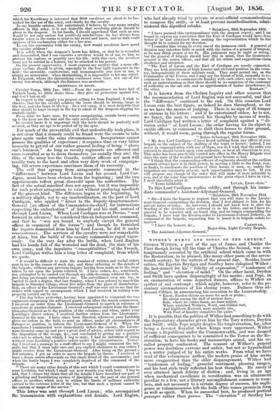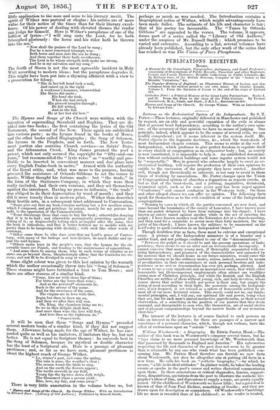WITHER'S HYMNS AND SONGS OF THE CHITECIE. * GEORGE WrrirEn, a
poet of the age of James and Charles the First though living till the time of Charles the Second, was con- temptuously censured by the artificial school which came in with the Restoration, to be praised, like many other poets of the seven- teenth century, by the writers of the present day. Besides lesser critics Sir Egerton Brydges and Southey have eulogized Wither : the bilk-named for his felicity of expression," "tenderness of feeling," and "elevation of mind." On the other hand, Dryden and Swift have spoken disparagingly of his merits ; and Pope, in an enumeration of some d.eparted dunces, affixes to Wither an epithet of sad contempt ; which might, however, refer to the pe- cuniary circumstances of his closing years. Dulness thus ad- dresses Cibber, in announcing his accession to the Laureateship. "Know, Eusden thirsts no more for sack or praise ; Ile sleeps among the dull of ancient days ; Safe, where no critics damn, no duns molest, Where wretched Withers, Ward, and Gildon rest, And highborn Howard, more majestic sire, With Fool of Quality completes the quire."
It is possible that the politics of Wither had something to do with the depreciatory character given him by the Tory writers, Dryden and Swift ; while Pope might despise his tergiversation, for after being a devoted Royalist when Kings were uppermost, irither, became a Republican under the Commonwealth, and was deemed of sufficient consequence to be committed to the Tower on the Re- storation, to have his books and manuscripts seized, and. his so- called property confiscated. The censure of Wither's general power was doubtless extreme and unfair, but not so hyperbolical as a writer judged of by his entire works. From what we have read of this voluminous author, the modern praise of him seems more exaggerated than the older disparagement. Wither had "tenderness of feeling," graceful sentiment, pleasing images, and his best style truly ;efiected his best thoughts. He rarely if ever attained much felicity of diction; and, living in an age when mechanical excellence in versification was an attainment peculiar to a few, not a literary accomplishment common to num- bers, and not necessary to a certain degree of success, his negli- gence or voluminousness left the bulk of his verses prosaic in form as well as spirit. When he succeeded best, he produced poetical passages rather than poems. The "elevation of Southey has little application to the man and none to his literary merit. The spirit of Wither was pastoral or elegiac ; his satires are of more value for their notice of the times than for their literary.excel- lence. Of his power of dealing with elevated themes the reader eau judge for himself. Here is Wither's paraphrase of one of the loftiest of lyrics..—" I will sing unto the Lord, for he ha& triumphed gloriously : the horse and his rider bath he thrown into the sea."
"Now shall the praises of the Lord be sung ; For he a most renowned triumph won : Both horse and man into the sea he flung; And them together there hath overthrown.
The Lord is he whose strength dots make me strong,
And he is my salvation and my song."
The death of Sisera is not the most agreeable incident in Holy Writ according to modern ideas; but the paraphrase degrades it. This might have been put into a rhyming affidavit with a view to a prosecution for felony.
"She in her left hand took a nail, And raised up in the right A workman's hammer, wherewithal She Sisera did smite ; His head she took, When she had struck His pierced temples through; He fell withal, And in the fall He at her feet did bow."
171e .7Tymn8 and Songs of the Church were written with the intention of superseding Sternhold and Hopkins. They are di- vided into two books ; the first containing the lyrics of the Old Testament, the second of the New. These again are subdivided into various parts ; as the hymns found in the books of Moses, and the other books called H:agiographa • the Song of Solomon, the hymns in the Prophets, and so forth. The New Testa- ment portion also contains Church services—as Saints' Days, and the Athanasian Creed. Xing James granted the poet a patent, which not only secured the copyright for "fifty-and-one years," but recommended the "lyric verse as "worthy and pro- fitable to be inserted in convenient manner and due place into every English Psalm-book in metre." Armed with the authority of the Royal critic, and, what was more to the purpose, having procured the assistance of Orlando Gibbons to set the verses to music, Wither thought his fortune made : but "the trade," in the form of the Stationers Company, in which they were then really included, had their own versions, and they set themselves against the interloper. Having no press to influence, "the trade" was obliged to do their depreciation by word of mouth ; and they did. it more tersely than in modern print. Wither thus describes their hostile arts, in a subsequent tract addressed to Convocation. "Some give out that my book contains nothing but a few needless songs, which I composed, and got privilege by patent, merely for my private be-
nefit, to the oppression of the Commonwealth. "Some discourage those that come to buy the book ; otherwhiles denying that it is to be had ; and otherwhile peremptorily protesting against the selling of it; or disgracefully telling such as inquire after the same, that the book is ridiculous, and that it better befitted me to meddle with my poetry than to be tampering with divinity ; with such like other words of contempt.
"Other some there be who dare aver that my Lord's grace of Canter- bury, with many of the bishops and best divines, do much dislike and op- pose the said hymns.
"Others again buzz in the people's ears, that the hymns for the ob- servable times are Popish, and tending to the maintenance of superstition.
"And some there be among them, who in such terms of ribaldry as no stews.can go beyond them blasphemingly affirm that the Canticles are ob- scene, and not fit to be divulged in song or verse."
Some slight colour was given to this last opinion by the warmth which the author occasionally threw into his "Song of Solomon." These stanzas might have furnished a hint to Tom Moore ; and there are other stanzas of a similar kind.
"Come, kiss me with those lips of thine ; For better are thy loves than wine ; And as the powered* ointments be, Such is the savour of thy name. And for the sweetness of the same, The virgins are in love with thee.
Begin but thou to draw me on, And then we after thee will run.
Oh, King, thy chambers bring mete; So we in thee delight shall find, And more than wine thy love will find, And love thee as the righteous do."
* Poured forth.
It will be seen that these "Songs and Hymns" preceded several modern books of a similar kind, if they did not suggest them. Allowance being made for the age of Wither, he has suc- ceeded quite as well as his imitators, if imitators they be, but not better. He is not equal to Scripture themes : he succeeds best in the Song of Solomon, because its mystical or double character has the least of a Scriptural air. Here is a passage of pleasant prettiness ; and, so far as we have seen, pleasant prettiness is about the highest reach of George Wither.
"Lo, winter's past, and come the spring, The rain is gone, the weather's clear ; The season wooes the birds to sing, And on the earth the flowers appear ; The turtle croweth in our field, Young figs the fig-tree down doth weigh, The blossomed vines a savour yield : Rise, love, my fair, and come away."
There is -very little annotation in the volume before us, but Hymns and Songs of the Church. By George Wither. Wills an Introduction by Edward Farr. [Library of Old Authors.] Published by Russell Smith.
perhaps as inneh as was needed. The Introduction contains a 13iographinal notice of Wither, which might advantageously have been made fuller. The estimate of his life and character is fair; that of his poetry too favourable. The "Tunes by Orlando Gibbons" are appended to the verses. The volume, it appears, forms part of a series called the "Library of Old Authors," under the auspices of Mr. Russell Smith ; which promises to be varied and extensive. According to a list, several volumes have already been published, but the only other work of the series that has reached us was The Vision of Piers Ploughman.



























 Previous page
Previous page